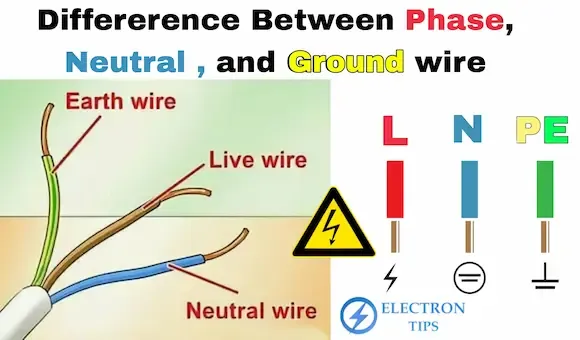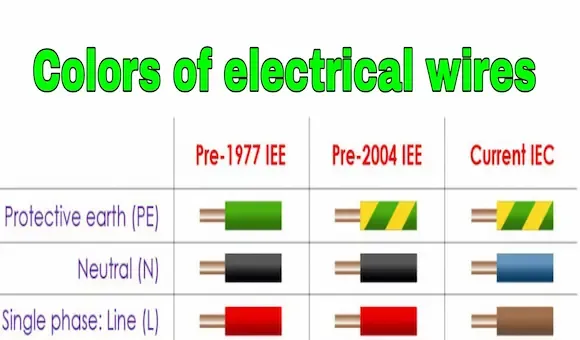 |
| Difference between Phase , Neutral , and Ground wire |
What are the differences between live, earth and neutral wire
Electrical wires in home electricity can be divided into three types: phase wire - neutral wire - ground wire, Each of them has a specific and important role in home electricity circuits, and in this article we will learn about the role and importance of each of them.
The importance of the neutral wire:
The importance of the neutral wire is evident in two important functions, the first of which is that it acts as a zero reference point for the electrical voltage, and the second function is that it provides a path for the return of the electrical current that comes from the live wire. It is impossible to operate an electrical circuit with only one wire as the electrical current does not have a closed path for its return to the source and thus the absence of potential difference.
 |
| Electrical Wires |
Thus, the neutral wire is a necessary line to operate household electrical appliances, where the second wire is in a single-phase system and the fourth wire is in a three-phase system. There may be cases in which there is no need for the neutral wire, such as operating three-phase motors, and the reason for this can be identified by This topic is why three-phase motors don't need a neutral wire.
The importance of the ground wire:
The ground line is a safety wire to protect electrical devices and protect people from electric shock, as it provides a path for the electrical current to pass to the ground in the event of an electrical current leak. Its presence is considered unnecessary for the operation of the electrical devices. It is installed on the external structure of the electrical devices and is connected to the ground through what is called the grounding circuit. When there is an electrical current on the body of the device (refrigerator - washing machine - TV...) it passes directly to the ground, so that touching it will not expose you to danger because the resistance of your body is greater than the resistance of the ground wire.
The importance of the phase wire:
The phase wire or phase wire is the hot line that carries electricity and plays an essential role in operating electrical appliances. It is considered one of the most dangerous electrical wires, whether in a single-phase system or a three-phase system, and electrical appliances cannot operate without it.
The difference between the neutral wire, the ground wire, and the phase in electrical circuits:
The main difference between the neutral (neutral) and the ground is that the neutral provides a closed path for the circuit and the return of the current to the original source, while the ground wire connects to the metal parts of the devices and provides a path for the fault current to pass from the devices to the ground for the purpose of protecting them from electric shock, It also protects people.
- The ground wire provides a low-resistance path for the current and acts as a safeguard against leakage currents.
- In normal cases, the ground line does not carry any current, but when the insulation collapses, it carries leakage current.
- The ground wire represents a path for leakage current for electrical devices.
- The neutral wire in an AC circuit carrying current in normal condition, the neutral provides the return path and thus balances the load.
- The neutral wire is always charged with electrical current.
- The neutral wire can be converted to ground.
- The neutral represents a return path for the current and is called the reference point. Its color is blue.
- The phase wire is responsible for transmitting electrical energy and is often colored red, black, brown, or both in a three-phase system.
- The ground line is yellow and green in color and provides a safe path for leakage current to return.

Difference between Phase , Neutral , and Ground wires
Comments
Post a Comment